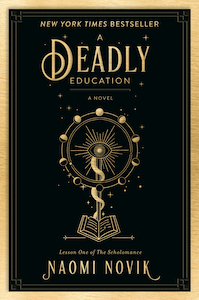A Deadly Education by Naomi Novik
 The Scholomance is one of the most fascinating magic schools that I've ever attended. It straddles the boundary between the physical world and "the void," which is a malleable space that operates on the power of collective belief, hence all the blueprints on the walls to keep the structure subconsciously reinforced. The heart of this round, complex design is a giant, corkscrew-like mechanism that rotates the resident halls from top to bottom while the classrooms, library, and cafeteria remain in place, every graduation day.
The Scholomance is one of the most fascinating magic schools that I've ever attended. It straddles the boundary between the physical world and "the void," which is a malleable space that operates on the power of collective belief, hence all the blueprints on the walls to keep the structure subconsciously reinforced. The heart of this round, complex design is a giant, corkscrew-like mechanism that rotates the resident halls from top to bottom while the classrooms, library, and cafeteria remain in place, every graduation day.
In this world, being magical is more of a curse than a blessing. Voracious monsters that feed on mana (one's own magical energy as opposed to malia, which is the taking of magical energy from living things) are essentially drawn to you, especially when you're at your ripest during puberty. As a teenager who'd extended my youth in order to attend as many magic schools as desired, I was itching for a challenge with much higher stakes, the ultimate test. I wanted to know exactly how far I could go.
I wondered when I would find a book with such a school. Interestingly, it wasn't long before my wish was granted in the form of a publishing headline that grabbed my attention. The article described a magic school where failure meant "certain death." I preordered the book and anticipated its release since then. When it was finally in my possession and I began reading to get a sense of the world, my expectations were exceeded.
The Scholomance was built to protect the magical and weed out the weak at the same time. The complexity of its design made navigation for the monsters difficult—but not impossible—to reach the students. There were no teachers to defend us, let alone teach, so we had to make friends and keep them (without getting attached because death was a frequent visitor), never daring to venture out of our rooms alone, for the sake of survival. Woe unto you if you had none, like Galadriel "El" Higgins.
El is the protagonist of the story, though she often battled with that word. She kept to herself and trusted nobody, but if you managed to melt her icy exterior and grow close to her like I did, she could chew your ear off. Oh, she could talk. I feared her incessant rambling would kill me before the school did.
But I understood. You see, El is lonely. Being the prophesied bringer of death and mass destruction will do that to you. Not that the other students were aware, but nobody was ever particularly comfortable around her. They'd always sensed something ominous about the girl, like how animals can sense the stirring of thunderstorms.
Fortunately I'm drawn to intense and complex characters who walk the gray line between black-and-white morality, on paper and in person. Approaching El at first was certainly awkward. She was immediately baffled and suspicious of me, figuring I wanted to use her in some way because friendships here were only strategic. She tried pushing me away, but I remained supportive and shared her rawest sympathies toward the end about the enclaves, which are basically superpowered groups of rich wizards.
I did not get to see El embrace her fated, inner dark sorceress. Not that I wanted her to destroy the school, nor for her story to end in a cliché manner with Orion Lake—a fellow student as well as a monster slayer—trying to save her from darkness with something as cheesy as the power of love. But I was hoping for a part of the prophecy to unfold. I refrained from nudging El in that direction for fear that it would backfire on all of us. One half of me regrets it. The other half tells me to wait.
You must think I'm mad for having stayed in an entirely isolated, underground trap of a building with flesh-eating nightmares running amuck. Truly, I cannot bring magic and spells from one universe with me into another. That part of my being is rewritten by natural law. My only unchanging magical trait is the one with which I'd been born. So, I had to learn the ropes of mana and malia in this world as best and as quickly as possible.
After practicing so many of the same old enchantments in different universes, such as conjuring fire with an incantation here or communing with the forces of nature there, boredom sets in. The variations begin to blend and blur and all speak the same language. Maybe you risk burning yourself, or setting the classroom aflame at worst, but such challenges pale in comparison to those found in the Scholomance.

